#ios Development
Explore tagged Tumblr posts
Text
5-27-24: Day 95
Day 95 consisted of another milestone and the seventh consolidation day, reviewing what I learned, key points, and a challenge to build another complete app from scratch by ourselves:
Key points:
Functional programming
Result
Challenge: Build an app that helps users roll dice then store the results they had. At the very least you should let users roll dice, and also let them see results from previous rolls:
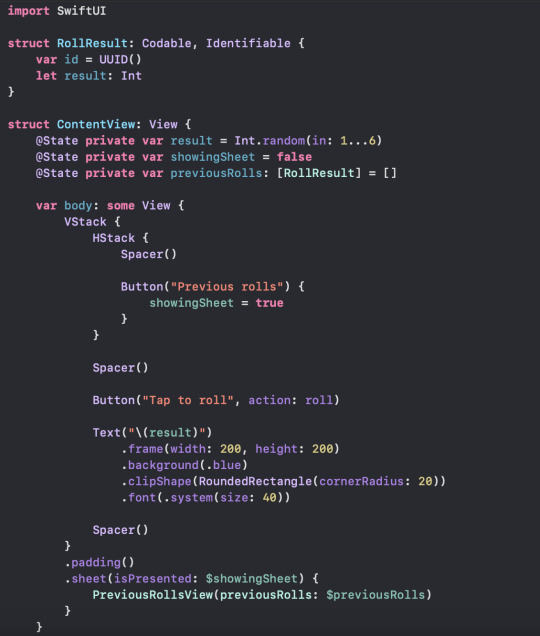
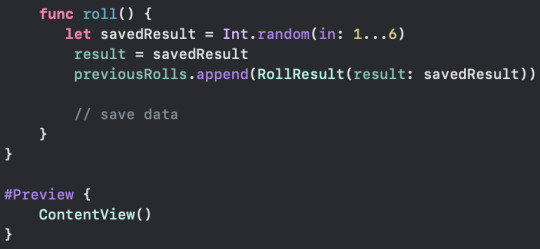

This is as far as I got. It's a skeleton, but I plan to expand on it much further in the future and make it a portfolio project.
Day 95 quote: "Being challenged in life is inevitable, but being defeated is optional." - Roger Crawford
#day 95#100 days of swiftui#ios#ios development#software development#software engineering#programming#coding#codeblr
19 notes
·
View notes
Text

Navigating the Complex World of Mobile App Development
In today’s tech-driven world, mobile apps have become a cornerstone of how we connect, work, and play. Whether you’re launching a startup or enhancing an established business, building a mobile app can be a game-changing move. One of the most important decisions you’ll face is choosing the right technology stack. The tech stack you pick will directly influence your app’s performance, scalability, and overall user experience.
What Exactly Is a Tech Stack?
A tech stack is essentially the set of tools, programming languages, and frameworks you use to build your app. For mobile apps, the stack typically consists of three main components:
Front-End: This is what users see and interact with — the app’s interface.
Back-End: This is the engine under the hood — handling data storage, processing, and integrations.
Platform: The operating system your app is built for, like iOS, Android, or both.
Key Considerations When Picking a Tech Stack
Let’s dive into the options and what you should think about when deciding which tools to use.
Platform Options
Native Development
Languages:
iOS: Swift or Objective-C
Android: Kotlin or Java
Pros:
Best-in-class performance.
Full access to device features like cameras, sensors, and GPS.
Cons:
Higher costs.
Longer development time if building for both iOS and Android.
2. Cross-Platform Development
Frameworks:
React Native (JavaScript and React)
Flutter (Dart)
Xamarin (C#)
Pros:
Faster development.
Reusable code for both iOS and Android.
Generally lower costs.
Cons:
Slightly lower performance compared to native apps.
Limited access to some advanced native features.
3. Hybrid Development
Tools:
Ionic (HTML, CSS, JavaScript)
PhoneGap/Cordova (HTML, CSS, JavaScript)
Pros:
Easy to learn and work with if you’re familiar with web development.
Leverages standard web technologies.
Cons:
Performance is not as strong as native or well-optimized cross-platform apps.
User experience can feel less “native.”
How to Make the Best Choice for Your App
Your decision will depend on several factors. Here are some key points to consider:
App Complexity:
For simple apps, cross-platform frameworks like React Native or Flutter are great choices.
For feature-heavy or complex apps, native development might be the way to go.
Time to Market:
If you’re on a tight schedule, cross-platform tools can speed up the process.
Budget:
Native development can be pricey since you’ll likely need separate teams for iOS and Android.
Cross-platform and hybrid options are usually more cost-effective.
Performance Needs:
Native apps deliver the best performance, but modern cross-platform frameworks have come a long way and can handle most needs efficiently.
Team Expertise:
Leverage the skills your team already has. If they’re experienced in JavaScript, for example, React Native might be a natural fit.
Final Thoughts
Choosing the right tech stack is a pivotal step in mobile app development. It’s about finding the perfect balance between your project’s requirements, your budget, and your team’s expertise. By weighing factors like app complexity, performance, and cost, you can make a well-informed choice that sets your app up for success. Remember, a solid tech stack is the foundation of a scalable, user-friendly, and high-quality app.
#mobile app development#android development#ios development#hybrid app development#cross platform app development#technology#software development#programming
2 notes
·
View notes
Text
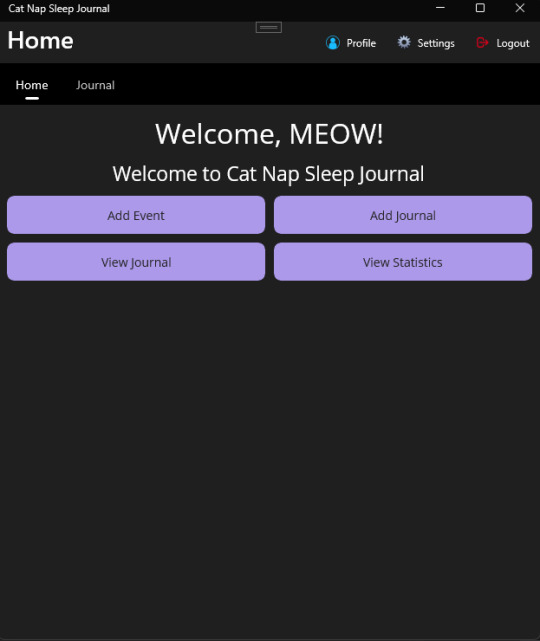
Days 63-72 it's been a lot!
The last few days I made a small adventure game in C++, did my C++ midterm, and wrestled with my C# homework program (Cengage is awful). The homework program used GitHub code spaces and mine is severely glitched and I can't turn in my code :/ so there's that. Just waiting on Cengage to fix it. Anyways I started on my C# final project called "Cat Nap Sleep Journal" it's an app that helps those with sleep disorders track their health for doctors to view. It's dedicated to my husband who has narcolepsy.
The next few days I'll be working on adding the pages for the buttons to go to, and adding the statistics which will be a beast I won't lie lol.
#self improvement#cosmickittytalk#csharp programming#csharp is superior#csharp#cs major#c++ language#c++ programming#college homework#college life#making an app#maui app#.net developers#.net framework#.net development#.net maui#.net#xamarin#andriod#ios#ios development#coding for a year#coding exercises#coding challenge#coding#girls who code#learning to code#codeblr#code#college project
2 notes
·
View notes
Text
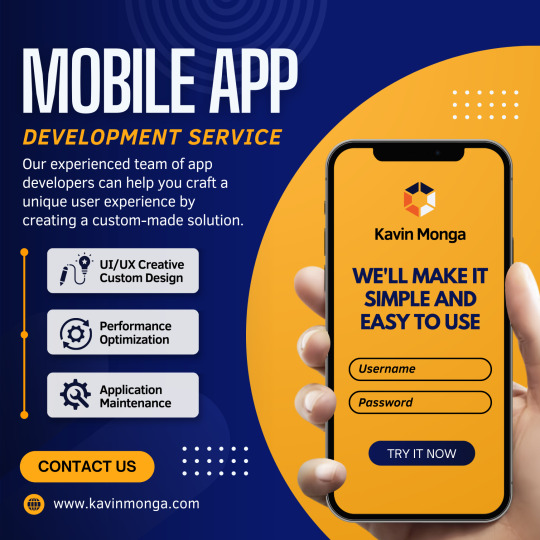
Ready to take your business to the next level? Look no further than #KavinMonga. With a solid 3 years in the software game, we're your go-to for killer mobile apps and top-notch software solutions. Let's skyrocket your success together with sleek #iOSdevelopment and custom-tailored software wizardry. 🚀💻 #TechInnovation #BusinessGrowth #CodeMaster #DigitalTransformation #KavinMongaMagic #WebDevWizard #softwaredeveloper #softwaredevelopment #developer #softwarecompany #kavinmongadesigns #kavinmonga #appdeveloper #app #ios #software #mobileappdevelopment #softwaredevelopment #development
#kavin monga#website#website designer#websitedevelopment#tumblr milestone#5 posts#development#digital marketing#seo service#social media management#software development#developer#app#software#ios#ios development#app development
2 notes
·
View notes
Text
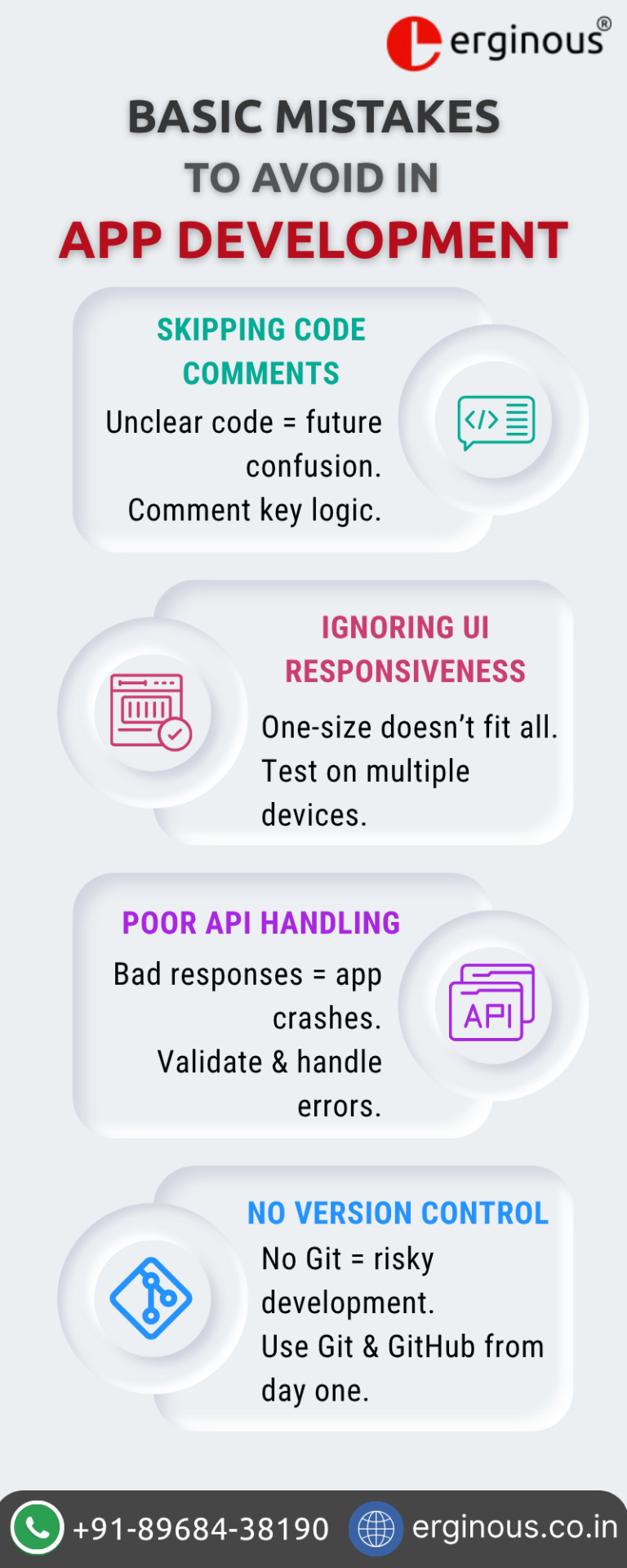
It highlights four common mistakes developers should avoid during app development. Skipping code comments can lead to confusion later, especially when revisiting complex logic. Ignoring UI responsiveness results in a poor user experience across different devices. Poor API handling, such as not validating responses, can cause app crashes. Lastly, not using version control like Git increases the risk of losing progress and hampers collaboration.
To avoid these mistakes and gain hands-on experience with industry practices, enroll in our expert-led app development training at Erginous Technologies.
Visit erginous.co.in or call us at +91-89684-38190 to learn more.
#industrial training#training#internships#erginous technologies#rajpura#app development#app development training#flutter development#android development#ios development#mobile app development#it company in rajpura#software company in rajpura#it company
0 notes
Text
Getting Started with Mobile App Development: A Practical Guide for Beginners and Businesses

In today's fast-moving digital world, mobile apps are no longer a luxury—they’re a necessity. Whether you're a startup founder, a healthcare innovator, or a business owner trying to modernize operations, diving into mobile app development is one of the smartest moves you can make. From idea to execution, the journey may feel overwhelming at first, but once you break it down, it's surprisingly achievable.
Let’s walk through what it really takes to get started with mobile app development—specifically for iOS platforms, hiring the right team, and creating something impactful, like a healthcare mobile app that could truly change lives.
Why Mobile App Development Matters More Than Ever
We live in a world where everything—banking, shopping, learning, and even managing health—is handled through smartphones. Apps aren’t just about convenience anymore; they’re about delivering value at the speed of life.
For businesses, a mobile app opens doors to direct customer engagement, streamlined operations, and new revenue streams. For users, it means instant access to solutions they need, right in their pockets.
Whether you’re a founder or a product manager, understanding the fundamentals of mobile app development will give you a strategic advantage. And if you're operating in industries like healthcare, that knowledge could empower you to create apps that genuinely improve patient outcomes.
Choosing the Right Platform: iOS vs Android
One of the first choices you’ll face is whether to build your app for iOS or Android. Ideally, you’d do both. But if you're just starting out, iOS often makes for a smoother entry point.
Why iOS?
Higher Revenue Potential: iOS users tend to spend more on apps and in-app purchases.
Consistency Across Devices: Unlike Android’s fragmented device ecosystem, iOS development focuses on a limited set of Apple devices, making testing and optimization easier.
Security: Apple’s stringent app review process ensures a safer ecosystem, which is especially important for apps dealing with sensitive data, like healthcare mobile apps.
While Android commands a larger global market share, many startups choose to build for iOS first, learn from user behavior, and then scale to Android.
Hiring the Right Team: The Power of Skilled Developers
You might be wondering: Should I learn to code myself? While tools like Flutter or React Native offer beginner-friendly ways to prototype apps, scaling a high-quality application usually means you need to hire mobile app developers.
Here's why a professional team is crucial:
Experience: Skilled developers know how to turn your vision into a polished, scalable app.
Efficiency: They save you time by avoiding common pitfalls.
Security & Compliance: Especially in sectors like healthcare, you need people who understand regulations like HIPAA and know how to build secure apps.
When choosing developers, look for a team that has experience in your niche. For example, if you’re building a medical app, you’ll want developers who have built healthcare mobile app development projects before. This is not just about writing code—it’s about understanding user needs, compliance, and integrating with systems like EMRs or wearable devices.
A great example of a company that bridges this gap is SMTlabs. They’ve worked on scalable app solutions across various industries, including healthcare, helping clients bring their vision to life with speed and precision.
Healthcare Mobile App Development: Building for Trust and Impact
If you're thinking about building a healthcare mobile app, congratulations—you’re stepping into a space with real potential to change lives. But this also means extra responsibility.
Here’s what you need to keep in mind:
User Privacy: Data sensitivity in healthcare is unmatched. You'll need to comply with regulations like HIPAA (in the U.S.) or GDPR (in the EU).
User Experience: The people using your app might be seniors, patients recovering from surgery, or overworked healthcare professionals. Simplicity is everything.
Integration: Many healthcare apps need to talk to other platforms—like Apple Health, FitBit, or hospital databases. Building these connections securely is a job for pros.
In healthcare, trust is everything. A small bug or confusing interface can cost not just users, but reputations. That’s why hiring experienced developers with a healthcare portfolio is non-negotiable.
From Idea to Launch: The Development Process
Whether you’re launching a telehealth platform or a simple fitness tracker, the development process usually includes:
Discovery Phase: Define your app’s purpose, target audience, and key features.
Wireframing & Design: Create mockups of the user interface.
Development: Code the app’s front-end (user interface) and back-end (server, databases).
Testing: Debugging, performance optimization, and user feedback.
Launch & Maintenance: Submit to app stores, monitor performance, and release updates.
And don’t forget post-launch support. The best apps evolve based on user feedback.
What About Budget?
Costs vary widely. A basic iOS app might cost $10,000 to $30,000. A complex healthcare mobile app could run upwards of $100,000, depending on features and security requirements. Hiring offshore developers can lower costs, but be cautious—poor code quality often leads to expensive rewrites.
Instead, work with a trusted partner who understands your vision. For example, a company like SMTlabs offers strategic consultation along with development services, ensuring you're building something both useful and scalable.
Final Thoughts
Starting your mobile app development journey might seem daunting, but it’s absolutely within reach. Whether you're building for iOS users, targeting the healthcare industry, or looking to hire mobile app developers who truly understand your vision, the key is to start with clarity and align with the right partners.
Mobile apps aren’t just digital tools anymore—they’re bridges between businesses and people, ideas and solutions, care and connection.
And if you're looking for a team to help you cross that bridge, SMTlabs has a proven track record of delivering results in some of the most demanding industries, healthcare included.
#mobile app development#flutter app development#ios development#hire developers#mobile application development#mobile app developers
0 notes
Text
We present a specific strategy on the basis of which the design and development of the Mobile Application Development Service in Dwarka . Our team of mobile app development consultants work with a team of UX and UI designers to ensure the best user experience while providing an excellent intuitive user interface. We study the latest industry trends and technologies, as well as proven techniques in the design of our mobile applications, ensuring a smooth, simple and aesthetic final prototype.
#mobile app development#Android development#iOS development#Flutter development#React Native#mobile apps#app developer#custom app development#arduino#Copy#Edit#app UI design#mobile UX#mobile UI#coding life#developer life#tech startup#programming#app builder#app marketing
0 notes
Text
Maintaining fast unit test feedback is crucial as an app and team grow over time. Without proper modularization, unit testing can become painfully slow. By structuring code into independent modules and utilizing macOS-based testing strategies, we can drastically improve test execution speed. This results in faster development, quicker bug fixes, and a smoother engineering experience. If you’re working on a growing iOS project, now is the time to start modularizing. Not only will it save you time today, but it will keep your project maintainable and efficient as your team and codebase scale. Start with one module, test the benefits, and see the difference! 🚀
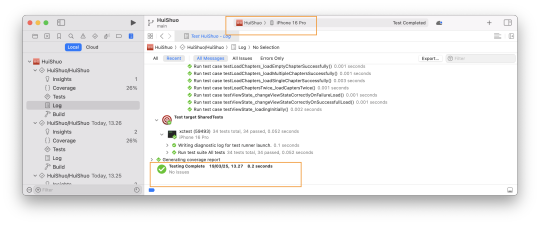
View On WordPress
#Good Programming Practice#Ios Development#Modularization#Software Development#Software Engineering#Test Driven Development
0 notes
Text
Android vs iOS app development: Key differences, costs, pros and cons, challenges
If you're planning a mobile app in 2025, one of the first decisions to make is whether to develop for Android or iOS. Both platforms come with their own strengths and challenges:
Different audiences and market share Varying development tools, timelines, and costs Unique monetisation opportunities
There’s no one-size-fits-all answer. The best choice depends on your specific goals, resources, and users. Read the full blog here: https://www.blackpiano.co.uk/post/android-vs-ios-app-development
0 notes
Text
4-20-24: Day 64
Day 64 consisted of 3 tutorials:
1. Loading photos from the user’s photo library
2. How to let the user share content with ShareLink
3. How to ask the user to leave an App Store review
Day 64 quote: "[The postage stamp’s] usefulness consists in the ability to stick to one thing until it gets there." - Josh Billings
#day 64#100 days of swiftui#ios#ios development#software development#software engineering#programming#coding#codeblr
3 notes
·
View notes
Text
iOS Development Services
HBit technology provides expert iOS development services to elevate your brand. We create powerful, protected, intuitive mobile applications for iPhone, iPad, and Apple Watch. Our custom iOS solutions aim to enable businesses to reach out to users and grow in the heavily contested Apple app store.
Why Choose Our iOS Development Services?
Custom iOS App Development: Tailored apps built to meet your unique business goals.
User-Centric Design: Stunning UI/UX designs that enhance user experience and engagement.
Performance and Scalability: Apps optimized for speed, reliability, and scalability.
End-to-End Development: We handle the full development cycle from concept to deployment.
Seamless Integration: Smooth integration with APIs, third-party tools, and Apple's ecosystem.
Robust Security: Advanced security features to protect user data and ensure compliance.
Our iOS Development Services
Native iOS App Development
Native iOS App Development: High-performing apps using Swift and Objective-C
Custom UI/UX Design
Interactive designs tailored for iOS devices.
Cross-Platform Solutions
Apps developed with Flutter or React Native for iOS and Android.
Enterprise iOS Solutions
Scalable apps to streamline enterprise workflows.
API Development and Integration
Seamless connectivity with backend systems and services.
App Maintenance and Support
Ongoing updates and technical support for peak performance.
0 notes
Text
0 notes
Text
Why Is iOS App Development en route To Success?

The popularity of Apple devices across the globe is soaring steadily with time and due to this iOS apps have witnessed an increase in demand among the world. If you analyze then you can see that there is a huge demand for iOS app development companies all over the world.
The iOS apps have captured the imagination of users all over the globe by providing fascinating and robust features as well as a completely reliable security system. Today, Apple is a leading company in devices and operating systems.
Competing on every front against Android, iOS App development uses one of the most extensively adopted mobile app development platforms. The scene is the same in India as iOS App Development India companies need to provide captivating applications that can take the success of enterprise on another level.
Why iOS app Development Booming

One business that is emerging as a lucrative business venture in recent times is iOS app development and most of the global Mobile App Development companies are jumping ship to iOS. Apple’s unyielding focus and commitment towards providing the customers with the best service and its constant effort to provide users with the utmost security is one of the reasons for its rise in popularity.
Every iOS app has to go through a rigorous assessment process based on the iPhone application development standard before it makes it to the iPhone app store. Only apps that pass through these standards are accepted and that is the reason why people have put their trust in iOS applications.
Factors that Make iOS the Future of Business Mobile App Development:

If you want to play a number’s game then Android is going to get the win but when it comes to revenue generated then there is even no comparison as Apple wins the battle with a huge margin. The following reasons why iOS is the future of app development:
High-quality Emulators
If you compare iOS with other concurrent operating systems then the speed of the iOS emulator is quite amazing. They not only provide you with better support but also enable developers to accelerate the application development process. It will also allow developers to make the entire app development cycle more feasible and more efficient.
Swift: popular and easy programming language
The coding part is the soul of the app as the basis on which the entire app development is built on it. The ethics of any app depends on the strength of coding. Swift is widely used by iOS developers and that permits delivering great results with minimalistic coding. It also plays the role of communicator between coder and computer to perfection.
Superior Developer support and tool
No other operating system can do what Apple has offered from the very beginning; the best developer system and tools of the industry. This attracts and influences app developers to use iOS due to its reliability and effectiveness.
Rendering of iOS development is easy and fast with these developer tools. The dedicated expert team of Apple is responsible for adding a function-rich library for iOS developers.
Increased revenue
As per stats, iOS users belong to the high-echelon earners and on an average, iOS users have more income when compared with users of other devices with different operating systems. Basically, the chances of spending money among users of Apple devices are on the higher side. This motivates application development companies to turn to the iOS platform.
Least bugs and fragmentations
Unlike operating systems that rode with the possibility of throwing bugs, apps created and developed with iOS are free of bugs! The types of devices and the number of the version being limited in iOS development resulting in a reduced number of bugs and easier app development processes.
Final Words
You may wonder: Do iOS App Development India companies deliver at this standard? The answer is a resounding yes. India is rapidly becoming a hub for skilled iOS talent, offering both quality and cost efficiency. If you’re planning your next mobile product, many businesses are choosing to hire iOS app developers in India for their technical expertise and innovative approach to problem-solving.
Opting for iOS app development could be a game-changing move—and finding the right development partner might just be the first step to success.
#ios app development#ios development#app development#application development#android app development#android application development#ios app developers
0 notes
Text
Boost Business Agility with DevOps Consulting and Azure DevOps Services.
In today’s competitive digital world, companies need to deliver high-quality software quickly and reliably, with minimal risk. At CloudKodeForm Technologies, our DevOps consulting aims to bring development and operations closer together. We streamline your delivery process and support your digital growth.

Why DevOps is Important DevOps is more than a popular term. It’s a way to change how teams work by uniting development and operations with shared goals. Using automation, integrated tools, and flexible practices, businesses can speed up software releases. They also get better system stability and performance.
CloudKodeForm Technologies provides DevOps management services that help fix common development delays. From planning and building to testing and deploying, our team makes sure each part of your software cycle is fast and scalable.
Our Full DevOps Consulting Services Our services look at your current setup, find gaps, and help you build a plan. Whether you are new to DevOps or trying to improve what you have, our experts offer:
Infrastructure as Code (IaC) setups
Automation of CI/CD pipelines
Container tools and management (Docker, Kubernetes)
Security measures integrated into workflows (DevSecOps)
Ongoing performance checks to improve results
We focus on aligning your tools, teams, and processes so you can deliver software smoothly and continuously.
DevOps Management: From Start to Finish Once your plan is ready, your next step is flawless execution. We support you with ongoing monitoring, support, and infrastructure management. Our team helps you:
Expand your system easily
Keep applications running smoothly
Manage cloud-based software
Follow rules and security standards
Our hands-on approach keeps your system safe and working well, reducing downtime and security risks. Your users will have a better experience too.
Making Your Delivery Faster The core of DevOps is the delivery pipeline. It automates everything from writing code to launching new features. This speeds up releases and cuts down mistakes.
At CloudKodeForm, we create pipelines for:
Continuous Integration (CI)
Continuous Delivery (CD)
Automated tests and quality checks
Deployment options like canary or blue-green releases
With a strong pipeline, you can push new features faster, respond quickly to market needs, and stay ahead of competitors.
Azure DevOps Setup: Easy Cloud Connection We also focus on Azure DevOps, giving you smooth connection to Microsoft’s cloud. From planning and coding to testing and releasing, Azure DevOps covers every stage.
Using Azure DevOps Services Sign In, your team can:
Work together with Git and project boards
Automate builds and releases with Azure Pipelines
Manage deployments with clear dashboards
Store and access project files securely
We help you set up and manage your Azure DevOps account fast, so everything stays secure and organized.
Azure DevOps Test Plans for Better Quality Quality matters in today’s software work. Azure DevOps Test Plans let us check your apps before they go live.
Our testing services include:
Manual and exploratory testing
Managing test cases and execution
Linking with CI/CD systems
Real-time reports and results
Using Azure DevOps Test Plans helps reduce bugs and improve app speed. It supports happier users and better performance.
0 notes
Text
Beginner’s Guide to Mobile App Development |Artzen Technologies
Introduction
Mobile apps are now essential for companies and entrepreneurs trying to reach a wider audience in today's digital environment. Knowing the basics of mobile app development is the first step to success, regardless of whether you have a game-changing idea or want to create an app for your company. Our areas of expertise at Artzen Technologies include UI/UX design, mobile SDK integration, iOS and Android programming, and app monetization. From conception to release, this tutorial will help you navigate the process of developing your first mobile application.
Step 1: Define Your App Idea and Goals
Before you start building your app, you need to be clear about what it does and who it’s for. Ask yourself these questions:
What problem does my app solve? Think about a common problem people face and how your app can make life easier. For example, if people struggle to find healthy recipes, your app could provide quick and easy meal ideas.
Who is my target audience? Decide who will use your app. Are they students, busy professionals, parents, or businesses? Knowing your audience helps you design an app that fits their needs.
What features should my app have? List the key things your app should do. Should it have a search option, push notifications, payment integration, or social media sharing? Focus on features that will truly help users.
Do Market Research Check if similar apps already exist. Look at what they do well and what they lack. Reading reviews can help you understand user pain points and improve your idea.
Conduct market research to validate your idea and identify competitors. Understanding user pain points will help refine your concept and create a unique app.
Step 2: Choose the Right Platform – iOS or Android?
One of the most important decisions in mobile app development is selecting a platform:
iOS Development: With an emphasis on the Apple environment, iOS apps are created with Xcode and need to be developed in Swift or Objective-C. In general, iOS consumers are more inclined to pay for apps.
Android Development: Developed with Android Studio and utilizing Java or Kotlin. Android is perfect for reaching a wider audience because of its bigger global market share.
Step 3: Plan Your App’s UI/UX Design
User experience plays a critical role in an app’s success. A well-designed app with intuitive navigation keeps users engaged. Key UI/UX principles include:
Simplicity: Keep your design clean and clutter-free.
Consistency: Use familiar icons and recognized movement.
Accessibility: Ensure your app is usable by people with challenges.
At Artzen Technologies, our UI/UX design team focuses on creating seamless and visually appealing interfaces to enhance user engagement.
Step 4: Select the Right Tech Stack
The technology you choose for your app affects how fast, secure, and scalable it will be. Here’s a simple breakdown of the key parts:
Frontend (What users see and interact with)
Swift for iOS apps
Kotlin for Android apps
Flutter if you want one app that works on both iOS & Android
Backend (How the app processes data)
Node.js, Firebase, or Django to handle user logins, store data, and manage app functions.
Database (Where data is stored)
MySQL, Firebase, or MongoDB to store user information, app content, or transactions.
Mobile SDKs (Extra tools for better features)
Use special tools (SDKs) for push notifications, analytics, and payment systems to improve your app.
Choosing the right technology makes your app run smoothly and keeps users happy.
Step 5: Develop and Test Your Mobile App
Once your design and tech stack are finalized, it’s time to start coding. Follow these best practices:
Use Agile Methodology – Break the development process into small tasks (sprints) and complete them step by step. This helps keep progress smooth and efficient.
Use Mobile SDKs – Add extra tools to your app, like:
Analytics to track user behavior
Crash reporting to fix bugs
Social logins to let users sign in with Google, Facebook, etc.
Step 6: Monetization Strategies for Your Mobile App
Take into account these app monetization techniques if you want to make money off of your app:
1. Fermium Model: Provide a free version with in-app purchases for premium features. 2. In-App Ads: These are display advertisements from Facebook Audience Network or Google AdMob. 3. Subscription Model: Charge users for access on a monthly or annual basis. 4. Paid Apps: These require a one-time payment in order to be downloaded. 5. Affiliate Marketing: Promote third-party goods or services to earn commissions.
Step 7: Launch and Market Your App
Once your app is ready, it’s time for launch! Follow these steps:
Submit to App Stores: Make your program available on the Google Play Store for Android and the Apple App Store for iOS. Make sure you adhere to all rules.
App Store Optimization (ASO): Use relevant keywords, , excellent screenshots, and a captivating app description.
Marketing Plan: Use influencer relationships, paid advertising, and social media to promote your app.
Step 8: Gather Feedback and Improve
After the app launches, keep an eye on user reviews and its functionality. Track user behavior and pinpoint areas for improvement using tools like App Store reviews, Firebase Analytics, and Google Analytics. Your app remains competitive and relevant with regular upgrades.
Conclusion
Building your first mobile app may feel challenging, but with the right plan and tools, you can make it happen! Whether you're developing for iOS, Android, or both, focusing on good design (UI/UX), useful features (Mobile SDKs), and smart earning methods (App Monetization)will help your app succeed.
At Artzen Technologies, we turn ideas into powerful mobile apps. If you're ready to bring your app to life, contact us today, and let’s make it happen.
0 notes